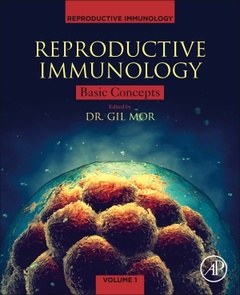Reproductive Immunology Basic Concepts Reproductive Immunology Series
Coordonnateur : Mor Gil

Reproductive Immunology: Basic Concepts gives a holistic insight into the understanding of the complex interactions between the maternal immune system and the fetal/placental unit necessary for the success of pregnancy. This interaction is critical for the support of the human fetal semiallograft and the protection against infections. The book covers various topics such as B cells, macrophages, T cells, discussion on fetal signals and their impact on maternal reproductive cells such as endometrial cells, mast cells, and the role of fetal Hofbauer cells, the immune regulatory role of glucorticoids, and many other novel topics within the field of reproductive immunology.
Edited and written by experts in the field, this book introduces the up-to-date knowledge of the role of the immune system during pregnancy and provides the necessary background to understand pregnancy complications associated with alterations in the functioning of the immune system. The book provides a complete discussion on the immunological aspects of pregnancy and serves as a great tool for research scientists, students, reproductive immunologists and OBGYNs.
1. The role of the immune system during pregnancy: General concepts 2. Presentation and recognition of placental, fetal, and pathogen-derived antigens in human pregnancy 3. Uterine macrophages: Essential roles for a successful human pregnancy 4. Natural killer cells in reproduction: Before, during and after pregnancy 5. To B (e) born: New concepts concerning B cells throughout pregnancy 6. Neutrophils: Diverse functions in the endometrium of cycling women and during pregnancy 7. Regulatory T cells: Master regulators for the success of pregnancy 8. Immunology of the decidua 9. Mechanism of glucocorticoid action in immunology—Basic concepts 10. Endocrine control of mucosal immunity in the human female reproductive tract: Bridging implantation with pathogen protection 11. The nature of the immune response in microbial-associated and sterile intraamniotic inflammation 12. Autoimmunity, regulatory T cells, and pregnancy: Maintaining the balance 13. Mucosal immunology of the female reproductive tract and its regulation by female sex hormones 14. Toll-like receptors and NOD-like receptors at the implantation site 15. Hofbauer cells and placental viral infection 16. Gamma/delta T cells in pregnancy 17. Placental regulation of immune functions 18. TAM receptors in pregnancy 19. The epigenetic regulation of the immune system during pregnancy 20. Interactions between the epithelial barrier and the microbiota in the reproductive tract
He has been funded by grants from the National Institute of Child Health Development (NICHD), National Cancer Institute (NCI), and National Institute of Allergies and Infectious Diseases (NIAID) as well as by several pharmaceutical companies and is widely published in the area of immunology and reproduction with more than 280 publications and is the editor of three books on “Immunology of pregnancy and “Apoptosis and Cancer. He is also the Senior Editor of a book series on Reproductive Immunology with Elsevier.
He is the recipient of several national and international prizes, including the Pearl River Professor from Jinan University Guangzhou China, the J. Christian Herr Award, and the AJRI Award from the Society for Reproductive Immunology.
He is a member of the American Association for Cancer Research, the Society for Gynecologic Investigation, American Association of Immunologists and the American Society of Reproductive Immunology. He is also a Member of the International Advisory Committee for the Sino-American Center of Translational Medicine. Southern Medical University, China, Guest Professor
- Shows the detailed evaluation of the knowledge related to each immune cell type in the pregnant and not pregnant uterus
- Evaluates each immune cell type and its function during specific reproductive events
- Provides the biological background for understanding the clinical aspects that will be discussed in subsequent volumes in the series
Date de parution : 02-2021
Ouvrage de 460 p.
19x23.3 cm
Thème de Reproductive Immunology :
Mots-clés :
Abnormal uterine bleeding; Adaptive immunity; Alloantigen; Amniotic fluid; Antiphospholipid syndrome; Autoimmune disease; Axl; B cells; Cervix; Changing phenotypes; Chorioamnionitis; Cytomegalovirus; DALT; Decidua; Decidual immune cells; Decidualization; Developmental origins; DNA methylation; Effector T cells; Effector Treg cell; Endometrial repair; Epigenetic modifications; Epigenetics; Epithelial barrier; Evolution; Extracellular vesicles; Female reproductive tract; Female sex hormones; Fetal gamma/delta T cells; Fetal inflammation; Fetal tolerance; Feto-maternal tolerance; Fetus; FRT; Glucocorticoid; Glucocorticoid receptor; Growth-promoting factors; Histocompatibility; Histone methylation; HIV; HLA-C; HLA-G; Hofbauer cells; Human endometrium; Human pregnancy; Immune cell trafficking; Immune tolerance; Immunity; Immunology; Immunomodulation; Implantation; Infection; Inflammation; Inflammatory mediators; Innate immunity; Labor; Lactobacillus; Macrophages; Maternal gamma/delta T cells; Maternal immune system; Maternal immunotolerance; Maternal-fetal interface; Maternal-fetal interface; Menstrual cycle; Menstruation; Mer; Microbiome; Microbiota; Miscarriage; Monocytes; Mother; Mucosal immunity; Mucus; Multifunctional cells; Myometrium; Natural killer cells; Naturally occurring Treg cell; Neutrophil biology; Neutrophil extracellular traps (NETs); Neutrophil identification and isolation; Neutrophils; NK cells; NOD-like receptors; Obstetrical complication; Parturition; Peripherally induced Treg cell; Phenotype; Placenta; Placental development; Preeclampsia; Pregnancy; Prenatal; Preterm birth; Probiotics; Regulatory T (Treg) cells; Regulatory T cell; Regulatory T cells; Reproduction; Reproductive immunology; Sex differences; Sex hormones; Spiral artery remodeling; Steroid hormone; T cells; TAM receptors; Tolerance; Toll-like receptors; Trophoblast; Trophoblast invasion; Tyro3; Uterus; Vagina; Vascular remodeling; Virology; Zika virus



